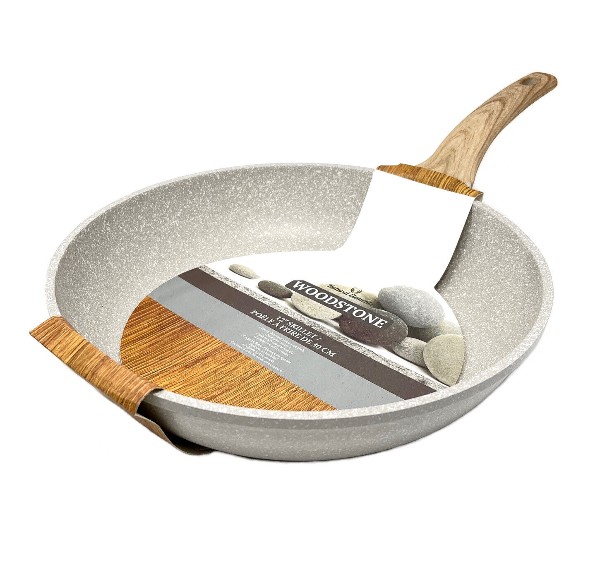Natural Element Cookware offers a unique approach to cooking. It focuses on using safe, eco-friendly materials.
This cookware not only enhances the taste of your meals but also promotes a healthier lifestyle. Many people are becoming more aware of what they use in their kitchens. Traditional cookware often contains harmful chemicals. In contrast, natural element cookware is made from materials like clay, stone, and stainless steel.
These options are safer for your health and the environment. Choosing natural cookware can change how you prepare food. It can improve your cooking experience and bring out the best flavors in your dishes. This post will explore the benefits of using natural element cookware and why it might be the right choice for you.

Credit: www.ebay.com.sg
The Essence Of Natural Element Cookware
Natural Element Cookware focuses on quality and sustainability. It uses materials that are safe for health and the environment. This cookware enhances your cooking experience. It brings out the best in your ingredients.
Why Choose Natural Materials
Choosing natural materials offers many benefits. Here are some reasons to consider:
- Healthier Cooking: Natural materials avoid harmful chemicals.
- Environmentally Friendly: These materials reduce pollution.
- Durability: Natural cookware lasts longer than synthetic options.
- Better Heat Retention: Natural materials distribute heat evenly.
The Connection Between Material And Flavor
The type of cookware affects the taste of food. Here’s how:
- Clay Cookware: Adds earthy flavors to dishes.
- Cast Iron: Enhances the natural taste of food.
- Stainless Steel: Does not react with ingredients.
Using natural materials can elevate your meals. The right cookware helps ingredients shine.
Exploring Types Of Natural Cookware
Natural cookware comes in many forms. Each type has unique benefits. Here, we will explore four popular kinds of natural cookware. They are clay pots, stone cookware, cast iron, and copper cookware.
Clay Pots And Their Timeless Appeal
Clay pots are ancient cooking tools. They have been used for thousands of years. Their appeal lies in their ability to retain heat.
- Even cooking and heat distribution
- Natural non-stick surface
- Enhances flavors in food
Clay pots are great for slow cooking. They keep moisture in, making dishes tender and flavorful. These pots can be used on the stovetop or in the oven.
Stone Cookware And Durability
Stone cookware is known for its strength. It can handle high temperatures well. This type of cookware is also very durable.
Benefits of stone cookware:
- Resistant to scratches and dents
- Good for grilling and baking
- Natural non-stick properties
Stone cookware is perfect for roasting meats and vegetables. It distributes heat evenly. This results in perfectly cooked meals every time.
Cast Iron Classics
Cast iron cookware is a kitchen staple. It has been used for generations. This cookware is known for its heat retention.
Key features of cast iron:
- Can be used on all heat sources
- Long-lasting and durable
- Improves with seasoning
Cast iron skillets are versatile. They can sear, sauté, bake, and even fry. With proper care, they can last a lifetime.
Copper Cookware And Even Heating
Copper cookware stands out for its beauty. It offers excellent heat conductivity. This means food cooks evenly.
Advantages of copper cookware:
- Quick response to temperature changes
- Lightweight compared to other metals
- Durable with proper maintenance
Copper pots are great for making sauces. They allow for precise temperature control. This ensures delicious results every time.
Benefits Of Cooking With Nature’s Tools
Cooking with natural element cookware offers many benefits. These tools enhance flavor, maintain health, and protect the environment. Let’s explore the key advantages of using nature’s cookware.
Enhancing Taste And Nutrients
Natural cookware improves the taste of food. It retains essential nutrients during cooking. Here are some ways it enhances your meals:
- Flavor Preservation: Natural materials keep the original flavors intact.
- Nutrient Retention: Cooking with natural tools helps maintain vitamins and minerals.
- Even Heat Distribution: This ensures your food cooks evenly, preventing burnt spots.
Non-toxic And Chemical-free
Using non-toxic cookware is vital for health. Many traditional cookware options contain harmful chemicals. Natural element cookware is free from these dangers. Consider these points:
- No Harmful Coatings: Avoid toxic non-stick surfaces.
- Safe Materials: Made from clay, cast iron, or stone.
- Healthier Cooking: Cook without worrying about chemical leaching.
Sustainability And Eco-friendliness
Natural element cookware supports a healthier planet. Choosing sustainable materials reduces environmental impact. Here’s why it matters:
| Benefit | Description |
|---|---|
| Biodegradable | Natural materials break down easily. |
| Less Waste | Durable cookware lasts longer than synthetic options. |
| Low Carbon Footprint | Natural resources have a smaller environmental impact. |
Choosing natural cookware contributes to a cleaner world.
The Art Of Seasoning Natural Cookware
Seasoning natural cookware is essential for its performance and longevity. Proper seasoning protects your cookware and enhances its cooking ability. Each type of cookware requires a different approach to seasoning. Understanding these methods can make your cooking experience better.
Seasoning Your Cast Iron
Cast iron is famous for its heat retention and even cooking. Seasoning cast iron creates a non-stick surface. Follow these steps:
- Clean your cast iron with hot water and a scrub brush.
- Dry it completely with a towel.
- Apply a thin layer of vegetable oil or shortening.
- Heat the oven to 375°F (190°C).
- Place the cookware upside down in the oven for one hour.
- Let it cool before using.
Repeat this process regularly for best results. A well-seasoned cast iron pan improves with age.
Caring For Clay Cookware
Clay cookware offers unique flavors. Proper care extends its life. Here’s how to care for it:
- Avoid sudden temperature changes.
- Soak in water before cooking.
- Use gentle cleaning methods.
Never use harsh chemicals. Rinse with warm water and air dry. Store it in a cool, dry place.
Maintaining Copper Pots And Pans
Copper cookware is prized for its heat conductivity. Maintenance is key to keeping it shiny. Follow these tips:
- Clean regularly with a soft cloth.
- Use a copper cleaner to remove tarnish.
- Store in a dry area to prevent oxidation.
Do not use abrasive cleaners. They can scratch the surface. With proper care, copper pots and pans will last for years.
Heat Distribution And Retention
Natural Element Cookware stands out for its excellent heat distribution and retention. Cooking with natural materials ensures even heating. This means less chance of hot spots. Foods cook evenly. This leads to better taste and texture.
How Natural Materials Cook Differently
Natural materials like clay, cast iron, and stone have unique properties. They absorb heat slowly and release it evenly. Here are some key points:
- Clay: Retains moisture and flavors.
- Cast Iron: Heats slowly but holds heat for a long time.
- Stone: Provides a consistent cooking surface.
Using these materials means you get better cooking results. Your meals will be more flavorful and juicy.
The Science Of Heat Conductivity
Heat conductivity is how well a material conducts heat. Different materials have different conductivity levels. Here’s a quick comparison:
| Material | Heat Conductivity (W/m·K) |
|---|---|
| Aluminum | 205 |
| Stainless Steel | 16 |
| Cast Iron | 50 |
| Clay | 0.5 – 1 |
Natural Element Cookware uses materials with lower conductivity. This results in better heat retention. Foods cook evenly without burning. The science behind these materials enhances your cooking experience.
Credit: www.ebay.com
Culinary Traditions And Natural Cookware
Natural cookware has deep roots in many cultures. These traditional methods connect us to our heritage. They offer a unique way to prepare food. Using natural materials enhances flavor. This post explores the significance of earthenware and its journey into modern kitchens.
Cultural Significance Of Earthenware
Earthenware has been used for centuries. It holds great cultural value across the globe. Here are some key points:
- Tradition: Many families pass down earthenware recipes.
- Connection: Cooking in clay brings people together.
- Health: Natural materials are safer and chemical-free.
Countries like India, Mexico, and Morocco value earthenware. Each culture has its unique designs and uses. Clay pots enhance the taste of local dishes. They also add a rustic charm to meals.
Historical Cookware And Modern Kitchens
Natural cookware has evolved over time. Many modern kitchens incorporate it. The history of cookware shows a shift from metal to clay.
| Time Period | Cookware Type | Common Uses |
|---|---|---|
| Ancient | Earthenware | Stews, grains, and breads |
| Medieval | Cast iron | Frying and baking |
| Modern | Natural ceramic | Slow cooking and roasting |
Today, natural cookware is popular for healthy cooking. Home chefs appreciate its ability to retain heat. Using natural materials also appeals to eco-conscious consumers.
Integrating earthenware into modern recipes is easy. Try baking bread or simmering soup in a clay pot. Experience the rich flavors and aromas that only natural cookware can provide.
Choosing The Right Natural Cookware For Your Kitchen
Natural cookware is a healthy choice. It can enhance your cooking experience. Choosing the right cookware makes a difference. It affects your food and your health. Here are some key points to consider.
Factors To Consider
Several factors help you choose the best natural cookware. Consider the following:
- Material: Popular options include cast iron, ceramic, and stainless steel.
- Heat Resistance: Check how much heat the cookware can handle.
- Durability: Look for long-lasting materials that won’t chip or crack.
- Maintenance: Some materials require more care than others.
- Size: Choose sizes that fit your cooking needs and kitchen space.
Matching Cookware To Your Cooking Style
Your cooking style matters. It helps to select the right cookware. Here are some common styles:
| Cooking Style | Recommended Cookware |
|---|---|
| Frying and Searing | Cast iron or stainless steel |
| Baking | Ceramic or glass |
| Sautéing | Non-stick or stainless steel |
| Slow Cooking | Ceramic or cast iron |
| Steaming | Stainless steel or bamboo |
Understand your cooking habits. Choose cookware that fits your style. This makes cooking easier and more enjoyable.
Recipes That Shine With Natural Element Cookware
Cooking with Natural Element Cookware enhances flavors and textures. This cookware preserves the natural goodness of your ingredients. It makes every meal shine with taste and quality.
Bringing Out The Best In Ingredients
Natural Element Cookware is perfect for any kitchen. Its unique materials help maintain the nutrients in your food. Here are some tips to bring out the best in your ingredients:
- Use fresh, seasonal produce.
- Cook at the right temperature.
- Experiment with herbs and spices.
- Choose the right cookware for each dish.
These simple actions enhance the flavors of your meals. Natural Element Cookware allows you to cook in a healthier way.
Signature Dishes For Different Types Of Cookware
Different types of Natural Element Cookware suit various recipes. Here are some signature dishes for each type:
| Cookware Type | Signature Dish |
|---|---|
| Cast Iron Skillet | Perfectly Seared Steak |
| Ceramic Baking Dish | Vegetable Lasagna |
| Stainless Steel Pot | Hearty Vegetable Soup |
| Non-Stick Frying Pan | Fluffy Omelette |
Each dish shines when cooked with the right cookware. The flavors come alive and impress everyone at the table.
Try these recipes with your Natural Element Cookware. Enjoy cooking and eating delicious meals that highlight fresh ingredients.
Care And Maintenance Of Natural Cookware
Natural cookware needs proper care to last. Maintaining it helps keep your food safe and tasty. Follow these tips to ensure your cookware stays in great shape.
Cleaning Tips For Longevity
Cleaning natural cookware requires special attention. Here are some effective tips:
- Use mild soap: Harsh soaps can damage the surface.
- Soft cloth or sponge: Avoid steel wool or abrasive scrubbers.
- Hand wash: Do not put in the dishwasher.
- Dry immediately: Prevent water spots and rust.
For stubborn stains, soak in warm water. Use a paste of baking soda and water. Gently scrub with a soft cloth.
Storage Solutions To Avoid Damage
Proper storage keeps your natural cookware safe. Here are some solutions:
| Storage Method | Description |
|---|---|
| Stacking with care | Use cloth or paper between pieces to prevent scratches. |
| Hanging | Use hooks to store cookware. This saves space and avoids dents. |
| Dry storage | Keep in a dry place. Moisture can cause damage. |
Check your cookware regularly for signs of wear. Fix any issues early to extend its life.

Credit: naturalelementscookware.com
The Future Of Cooking: A Return To Natural Elements?
Cooking is evolving. Many people are turning back to nature. They seek cookware made from natural materials. This shift reflects a desire for healthier cooking options. Natural element cookware meets this need. It combines tradition with modern needs.
Trends In Cookware Materials
Cookware materials are changing. Here are some popular trends:
- Cast Iron: Known for its durability and heat retention.
- Clay Pots: Great for slow cooking and enhancing flavors.
- Stainless Steel: Non-reactive and easy to clean.
- Glass: Safe for baking and offers a non-toxic option.
- Wood: Used for utensils and serving dishes.
These materials are environmentally friendly. They reduce chemical exposure. Many cooks prefer these options for their health benefits.
The Growing Appeal Of Traditional Cooking Methods
Many people find joy in traditional cooking. These methods connect us to our past. Here are some reasons for this appeal:
- Healthier Meals: Cooking with fresh ingredients enhances nutrition.
- Flavor: Natural materials improve taste.
- Mindfulness: Cooking can be a calming activity.
- Community: Sharing meals brings people together.
Natural element cookware supports these methods. It encourages creativity in the kitchen. People are enjoying cooking more than ever.
Frequently Asked Questions
What Is Natural Element Cookware?
Natural Element Cookware refers to cookware made from eco-friendly materials. It typically includes ceramic, stone, and non-toxic metals. These materials offer safe cooking options that don’t leach harmful chemicals. Natural Element Cookware is designed for durability and efficiency, making it a popular choice for health-conscious cooks.
Is Natural Element Cookware Safe To Use?
Yes, Natural Element Cookware is safe for cooking. It is made from non-toxic materials that do not release harmful substances. Many brands are free from PFOA, PTFE, and other harmful chemicals. Always check product specifications to ensure safety standards are met, enhancing your cooking experience.
How To Care For Natural Element Cookware?
Caring for Natural Element Cookware is straightforward. Hand wash with mild soap and soft sponges to prevent scratches. Avoid using metal utensils that can damage the surface. For longevity, follow the manufacturer’s instructions regarding heat settings and maintenance to keep your cookware in optimal condition.
Can I Use Natural Element Cookware On Any Stove?
Most Natural Element Cookware is versatile and compatible with various stovetops. However, always check the manufacturer’s guidelines for specific stove compatibility. Some cookware may be suitable for gas, electric, or induction stoves, while others may have limitations. Proper usage ensures the best cooking results.
Conclusion
Natural element cookware offers many benefits for your kitchen. It is safe and eco-friendly. Cooking with these materials can enhance flavors and improve your meals. They heat evenly, making cooking easier. Clean-up is simple, saving you time. Choosing natural cookware supports a healthier lifestyle.
Invest in your health and your cooking today. A small change can lead to better meals and well-being. Explore your options and find the right cookware for you. Enjoy cooking with nature’s best.





Leave a Reply